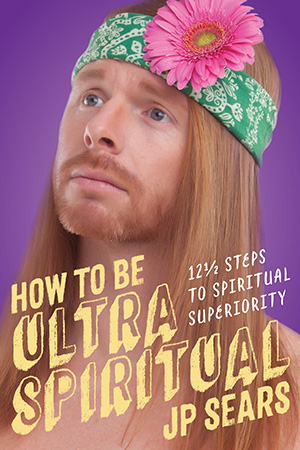
A satirist learns to use the healing power of humor to uncover hidden pain, make authentic connections and share true love
—
I remember being in the middle of the living room as a little red-haired seven-year-old boy performing for a prestigious audience: my mom, dad, and sister. They are like laughing puppets — with me in control of the strings. The living room is filled with delight while I stand center stage delivering a joke while already crafting the next.
My freckled face is lit up with a smile, but on the inside, my heart is pierced with the feelings of numbness and disconnection. The emotional distance, marital issues between my parents, isolation over my dad’s workaholism, my mom’s anxiety, and family secrets all create an intensity of pain that I don’t know how to deal with. That’s why I use humor to keep my family laughing in an effort to keep everyone connected.
Through humor, I learned to compensate for my pain. If I could deal out laughs, I was valued by, and therefore significant, to my mom. I’d be intoxicated with a sense of connection to my dad. Did I still feel insignificant and disconnected from them? Yes, but the convenience of the laughing factor helped me become an expert at not knowing it.
Injecting laughter into the lives of others gave me the high of disassociating from all the disconnection — for about three minutes.
And a sweet three minutes they always were! The sense of significance and superficial connection that I derived from those few minutes completely masked my inner reality. While the thrill quickly evaporated, it wasn’t a problem because I could easily find someone else to inject with laughter. My relentless need to make my family laugh made me very good at making other people laugh. I learned to intuitively read people to interpret what I could say that would amuse them.
As I got older, rather than just relentlessly reinforcing my escapism through laughter, a hunger for inner satiety tripped me into the spiritual world. In my spiritual quest, the part of me that craved the sense of safety and familiarity of disconnection loved the spiritual bypassing (using spiritual beliefs to avoid our painful feelings) strategies that abound in the New Age. Becoming even more disconnected from all the legitimate challenges of my humanness while simultaneously looking, sounding, and believing that I’m more connected was pretty appealing.
Unfortunately for this part of me, I met some inspiring and powerful teachers along the way. They genuinely helped me discover the pain in my heart. Even though it was buried under many years worth of jokes, smiles, and laughs, it was somehow all still there.
Kicking, screaming, and terrified, I was finding that I could replace the escapism with vulnerability. Like a toddler learning to walk, only shockingly more clumsy, learning to be vulnerable allowed me to connect to my inner pain that was caused by disconnection. I learned that my childhood engrained modus operandi of treating the pain of disconnection with the escapism of comedy only made the pain worse in the long run. It seems like simple math, yet it took me a long time to add it up.

Humor has the ability to help transform energy.
When we carry experiences that are painful, when we begin to look at them through the lens of humor, how they feel, how we react to them, and how we interpret them can change.
Oddly enough, I’ve found that as I can continue practicing the uncomfortable fine art of vulnerability, the genesis and affect of my comedy has changed. I’ve discovered that vulnerability lets my comedy spring forth from a place of inner connection, and based on my perception, it facilitates more kinship inside and outside of myself.
At the personal level, my humor seems able to be a bit of an alchemist, bringing me closer to my family and friends at a heart level rather than the pretend level that seven-year old JP knew all about. Sharing a joke with my father used to be a need sourced from a place of fear. Now it is a choice to share love.
Watch JP Sear’s short satire on becoming spiritual:
You may also enjoy reading Evolving Guys: The Enlightened Male as Seen Through the Lens of Humor by Randy Spelling
